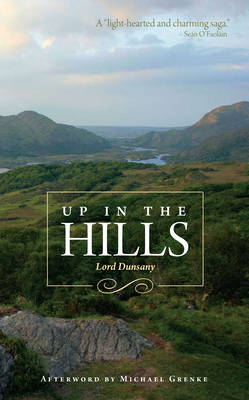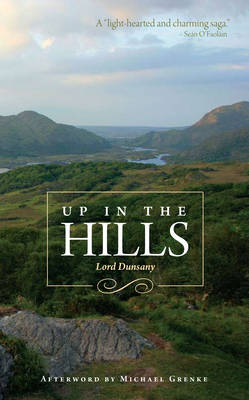
- Retrait gratuit dans votre magasin Club
- 7.000.000 titres dans notre catalogue
- Payer en toute sécurité
- Toujours un magasin près de chez vous
- Retrait gratuit dans votre magasin Club
- 7.000.0000 titres dans notre catalogue
- Payer en toute sécurité
- Toujours un magasin près de chez vous
Description
Up in the Hills "is too richly humorous, too full of wit, wisdom, gentle irony, salutary satire and the wonder which Spring offers to the welcoming eye to be read only by Dunsany's devotess."--New York Times
"No one can imitate Dunsany, and probably everyone who's ever read him has tried."--C. L. Moore
The hills stood for untameable things, things wild and no more to be checked by laws than the bright clouds that sparkled above them, and whose shadows all along the brows of the hills lay like a frown...the hills going right into cloudland.
What is there for an Irish lad to do when the old women of his village start leveling curses at visiting archaeologists, curses that may inadvertantly light upon innocent residents? Mickey Connor has a capital idea--he'll gather a small band of friends and take them up into the hills, to live there until the tumult in town subsides.
And how will they spend their time in the hills?
"Sure, I'd like to be a general," said Young Mickey. "Maybe we'll have a bit of war."
But the idyll that Mickey envisions is short-lived. For even in the hills of the newly independent Irish Free State, it's no easy thing, he discovers, to have "a bit of a war."
Yeats stayed in Dunsany's ancestral castle on numerous occasions and described Dunsany as "a man of genius...[with] a very fine style." Dunsany wrote his play The Glittering Gate at the request of Yeats, who wanted to "claim [Dunsany] for Ireland."
H. P. Lovecraft wrote of Dunsany, "To the truly imaginative he is a talisman and a key unlocking rich storehouses of dream." He also said of his own work: "There are my 'Poe' pieces and my 'Dunsany' pieces--but alas--where are my Lovecraft pieces?"
The critic S. T. Joshi wrote, "Let us marvel at [Dunsany's] seemingly effortless mastery of so many different forms (short story, novel, play, even essay and lecture), his unfailingly sound narrative sense, and the amazing consistency he maintained over a breathtakingly prolific output...Dunsany claimed aesthetic independence from his time and culture, [and] became a sharp and unrelenting critic of the industrialism and plebeianism that were shattering the beauty both of literature and of the world...yet retained a surprising popularity...through the whole of his career."
Edward John Moreton Drax Plunkett, 18th Baron Dunsany (1878-1957), inherited one of the oldest titles in the Peerage of Ireland. Lord Dunsany, who lived much of his life at Dunsany Castle in County Meath, was a prolific writer of novels, short stories, plays, essays, and autobiography. He is best known for his fantasy novels and stories, and his writing influenced the works of J.R.R. Tolkien, C.S. Lewis, H.P. Lovecraft, and Ursula K Le Guin, among others.
Spécifications
Parties prenantes
- Auteur(s) :
- Editeur:
Contenu
- Nombre de pages :
- 244
- Langue:
- Anglais
Caractéristiques
- EAN:
- 9781589880498
- Date de parution :
- 01-10-08
- Format:
- Livre broché
- Format numérique:
- Trade paperback (VS)
- Dimensions :
- 124 mm x 198 mm
- Poids :
- 272 g

Les avis
Nous publions uniquement les avis qui respectent les conditions requises. Consultez nos conditions pour les avis.






